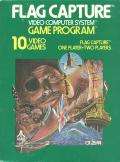Flag Capture
Flag Capture is a video game published in 1978 by Atari, Inc. for the Atari 2600. It is based on the traditional game Capture the flag.[1] The game was designed and programmed by Jim Huether.[2] The cover art for the game was by John Enright.[3]
| Flag Capture | |
|---|---|
 | |
| Developer(s) | Atari, Inc. |
| Publisher(s) | Atari, Inc. |
| Designer(s) | Jim Huether |
| Platform(s) | Atari 2600 |
| Release |
|
| Genre(s) | Puzzle |
| Mode(s) | Single-player, two-player |
The game was later included with the Atari Flashback 3 console.[4]
Gameplay
The player is shown a grid with white squares in it and must guess which square the flag is behind. To aid the locating of the flag the player may be shown a flag or a number to indicate where the flag may be.[5]
The game may be played in single-player mode, or in a two-player mode where the players play together.[1]
Reception
The reception both at the time of the release and later has been overwhelmingly negative. Videogamecritic.com in their review criticised the controls, the gameplay, the sound, and the graphics.[5] In Classic Home Video Games, 1972-1984: A Complete Reference Guide Brett Weiss described it as "one of the most primitive looking (and sounding) games ever".[1]
The game was, among a number of other Atari games, recommended for use in cognitive rehabilitation as it trained co-ordination of visual input with motor output.[6] The game was also used in a psychological test carried out on subjects from the US Navy related to skill-retention.[7]
References
- Weiss, Brett (2011). Classic Home Video Games, 1972-1984: A Complete Reference Guide. McFarland. p. 45. ISBN 978-0786487554. Retrieved 8 August 2019.
- "Flag Capture". Giant Bomb. Retrieved 4 September 2019.
- Lapetino, Tim (2016). Art Of Atari. Dynamite Entertainment. p. 80. ISBN 978-1524101060. Retrieved 2 September 2019.
- Purchese, Robert (7 September 2011). "Atari Flashback 3 console: 60 games, £50". Eurogamer. Retrieved 4 September 2019.
- "Atari 2600 Reviews 2600 - F". Videogamecritic.com. Retrieved 4 September 2019.
- Trexler, Lance E. (2012). Cognitive Rehabilitation: Conceptualization and Intervention. Springer Science & Business Media. p. 267. ISBN 978-1468442502. Retrieved 4 September 2019.
- Jones, Marshall B. (1 June 1984). "Videogames as psychological tests". Simulation & Games. 15 (2): 131–157. doi:10.1177/0037550084152001.